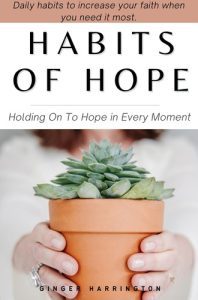Have you ever meant to practice gratitude—really meant to—but somehow the day passed in a blur? You had every intention of noticing God’s goodness, slowing down, paying attention…but then life happened. The laundry buzzer went off. Someone needed something. Dinner time arrived again. And before you knew it, the day was over.
There’s a question from Max Lucado that sticks wtih me:
“What if you woke up tomorrow with only the things you thanked God for today?”
Let’s just sit with that for a second.
When I first heard that question, my internal response was something like:
Oh boy. Okay. Well…that could get real sparse, real fast.
Not because we aren’t grateful.
Not because we don’t love God.
Not because we don’t see blessings in our lives.
But because life is full.
Full of responsibilities.
Full of people to care for.
Full of daily routines and repetitive tasks and the steady hum of “just keep going.”
And in the fullness of life—very often—it’s not our love for God that fades.
It’s simply our awareness.
In this post (and in the conversation from Episode 60 of the podcast), we’re talking about the real and very normal things that get in the way of practicing gratitude—not dramatic spiritual battles, but the subtle drift of ordinary life.
This is the quiet forgetting Scripture speaks to in Deuteronomy 8:11:
“Take care, lest you forget the Lord your God.”
Not because they stopped believing.
But because they stopped noticing.
And the instruction still applies:
Remember. Notice. Pause long enough to see what is already here.
Because gratitude doesn’t require a new life.
It invites us to see the life we are already living.

In This Post, You’ll Find:
- Why gratitude is so easy to lose track of (and why that doesn’t mean you’re doing anything wrong)
- A deeper look at Deuteronomy 8 and what it teaches us about remembering God in everyday life
- Common obstacles that make gratitude difficult when life is full and routine
- Simple, sustainable practices for weaving gratitude into your day without adding more to your schedule
- Gentle ways to begin again when you realize you’ve drifted from gratitude
- And a free printable to help you practice gratitude in small, consistent ways
What Does Deuteronomy 8 Teach Us About Remembering God?
When we look at Scripture, this drift isn’t new. God actually addressed it directly with His people in Deuteronomy 8—before they entered the promised land. They were about to move from a season of scraping-by survival to a life of stability, home, and abundance.
But right before the blessing comes, God gives them a very direct word:
“Be careful that you do not forget the Lord your God.”
—Deuteronomy 8:11
This isn’t soft language.
This isn’t a gentle suggestion.
This is a warning.
Because God knows the human heart.
He knows how easy it is—when life becomes normal, routine, and steady—to stop remembering the One who provided it.
He goes on:
“…when you eat and are satisfied, when you build fine houses and settle down… then your heart will become proud and you will forget the Lord your God.”
—Deuteronomy 8:12–14 (selected)
It’s not the hardship that threatens our gratitude.
It’s the comfort.
It’s the familiarity.
The “I’ve got this.”
The “I did this.”
The “This is just my life now.”
Not rebellion.
Just forgetting.
Gratitude doesn’t maintain itself automatically.
Without intention, we gradually shift into forgetting.
We said it this way in the episode:
Gratitude grows when we return to it on purpose — again and again.
That’s why this passage matters so much.
God isn’t shaming His people.
He’s calling them to a practice of remembrance.
Because remembering reorients the heart.
It keeps us grounded in truth.
It keeps us aware that everything we have has come from His hand.
Gratitude is how we keep God in view.
Forgetfulness is how He fades into the background.
How Forgetfulness Affects Our Relationship with God
Moses isn’t warning them because God is insecure — He’s warning them because forgetting always changes us. Ingratitude is not neutral. It slowly drifts us toward pride (“I earned this”), false security (“I can handle this myself”), and even idolatry (depending on created things instead of the Creator).
Gratitude interrupts that drift. It keeps our dependence on the Lord and our hearts humble.
It re-centers us in the truth that every ability, every opportunity, and every blessing has come from His hand.
So the question Deuteronomy 8 invites us to ask is:
Where might I be quietly forgetting God in my everyday life?
Not because we’ve turned away from Him—
but because our days are full, familiar, and fast.
And that is where the practice of gratitude becomes so life-giving.
Not as a performance.
Not as pressure.
But as a way to remember.
7 Common Obstacles to Gratitude
Even when our hearts are thankful, life has a way of crowding out gratitude. Most of the time, it’s not rebellion or lack of faith—it’s simply the reality of busy, ordinary days. Here are seven common obstacles that make gratitude harder and what you can do to overcome each one.
1) Getting stuck at the start (perfectionism + procrastination)
We wait for the “right” time—Monday, a new month, November—then never begin.
“We talk a lot about progress over perfection. We want to get started, not get stuck.” —Larissa
Try this: Identify your obstacle, write it down, and bring it to the Lord. Name your why (God calls us to it, and gratitude is transforming), then take one small step today.
2) “I don’t feel like it” (feelings as indicators, not drivers)
It’s all too easy to put off gratitude when we don’t feel particularly thankful.
“Choose gratitude even when I don’t feel like it… I’ve let it slip; I’ve been forgetting.” —Ginger
“If I waited to brush my teeth until I felt like it, it might not happen.” —Larissa
Try this: Treat gratitude like brushing your teeth—small, daily, regardless of mood.
3) Routine disruptions (seasons shift; practices adjust)
Illness, transitions, travel, big work projects—routines wobble.
“When you get out of routine… you just have to start again.” —Ginger
“Over 13+ years… the daytime/offline part shifted, but I’ve stayed grateful.” —Larissa
Try this: Adjust with the season. Move the practice to a different time/place. Use habit stacking (attach gratitude to something you already do).
4) “No time” vs. priorities (small but powerful)
Time feels scarce, but the deeper issue is intention.
“Gratitude doesn’t have to take long, but it does take intention… reframe it as small but powerful.” —Larissa
Try this: Replace “I don’t have time” with “gratitude is worth making space for.” Take baby steps. Notice any spiritual resistance and pray, “Holy Spirit, help me see what I’m holding onto.” (Ginger)
5) Simple forgetting (get-it-done mode)
We slide into task mode and gratitude falls off the radar.
“Forgetting is normal… the Holy Spirit often prompts when we’re slipping into whining or ingratitude.” —Ginger
Try this: Build “touch points”: Scripture art, a bracelet that says grateful, Post-it notes on the mirror/fridge/car, or phone alarms as nudge-cues. Let the Spirit help you return.
6) The mundane + rote repetition (when it feels stale)
Gratitude lists can get repetitive—“thank You for food, home…”—and feel stale.
“When I notice a rut, I ask, ‘Lord, open my eyes—give me a fresh vision of Your blessings.’” —Ginger
“Repetition isn’t bad—we learn by repetition. God brings more to mind over time.” —Larissa
Try this: Use the one-minute challenge: set a timer and name as many thanks as you can—serious or small—just to warm up your attention. Refresh with the Psalms when perspective needs renewing.
Gratitude begins with remembering, not feeling—and you can always begin again.
7) The Dippy Dailies (When Life Feels Mundane and Ordinary)
Real life is full of small tasks that repeat over and over—laundry, dishes, meals, schedules, emails, errands. None of it feels particularly sacred. But this is where gratitude is formed—not in the extraordinary, but in the ordinary.
This is where the conversation in the episode slowed down and we really leaned in. Let’s look more closely at what it means to find God in the everyday, repetitive moments of life.
Embracing Thanks the Mundane Moments of Life
In the episode, we talked about what Larissa and I jokingly call the “Dippy Dailies.”
These are the everyday tasks that repeat, over and over and over:
- Loading the dishwasher (again)
- Wiping the same kitchen counter
- Folding laundry that seems to multiply
- Running back out because you forgot one thing at the store
- Answering the same questions
- Managing schedules and meals and messes and routines
None of these are dramatic.
None of them feel spiritual.
They’re just… life.
And it’s exactly here—in the ordinary, repetitive, seemingly insignificant moments—that gratitude tends to fade. Not because we’re ungrateful, but because the familiar becomes invisible.
We stop noticing.
But here’s the thing we said together on the podcast, and I want to say it again here:
God is present in the Dippy Dailies, too.
If He is Emmanuel — God with us —Then He is with us in the kitchen, the laundry room, the carpool line, the grocery store aisle.
Gratitude isn’t about escaping real life.
It’s about noticing God in the middle of the life we’re already living.
And this is where we make the turn:
The mundane is not the enemy of gratitude.
It is the forge where gratitude is formed.
How Does Practicing Gratitude Help Us Remember God in Everyday Life?
If remembering God is the goal, then gratitude is the rhythm that keeps our hearts from drifting. Gratitude keeps our dependence on the Lord and our hearts humble.
Now that we’ve named the obstacles that get in the way of gratitude, let’s turn to what helps.
The next seven practices are simple ways to weave gratitude into everyday life—without adding pressure or complexity.Here are the practical ways we shared on how gratitude works in real, daily life:
1) Start even when you don’t feel like it.
Sometimes we wait for certain feelings before practicing gratitude.
Gratitude is a choice, not a mood.
Try: One simple sentence:
“Lord, thank You for _____.”
Small counts.
2) Attach gratitude to something you already do. (Habit Stacking)
This keeps the practice livable—not one more thing to schedule.
“When you brush your teeth, make that your cue.”
“When you wake up and get dressed, think of something you’re grateful for.” —Ginger
Other easy cues:
- First sip of coffee
- Buckling your seatbelt
- Turning on a light
- Laying down at night
Gratitude sticks when it has a place to land. Learn more about the power of Habit Stacking here.
3) Adjust with the season instead of quitting.
Life changes — routines will shift.
“You just have to start again.” —Ginger
“The practice has changed, but I’ve stayed grateful.” —Larissa
If mornings no longer work, try evenings.
If outside was your spot, move to the cozy chair in winter.
4) Reframe “I don’t have time.”
Time isn’t usually the real obstacle — intention is.
“Gratitude doesn’t have to take long, but it does take intention… small but powerful.” —Larissa
Two baby steps:
- One thanks before your feet hit the floor.
- One thanks when your head hits the pillow.
5) Ask the Holy Spirit to reveal resistance.
Sometimes the obstacle isn’t time — it’s pushback inside us.
“Lord, I’m sensing resistance—help me understand what this is about.” —Ginger
The Spirit gently surfaces what you’re holding onto,
so you can let go and return to thanksgiving.
6) Build “touch points” to interrupt forgetting.
Forgetting is normal — especially in get-it-done mode.
“The Holy Spirit often prompts when we’re slipping into whining or ingratitude.” —Ginger
Helpful touch points:
- Post-it notes on the mirror or fridge
- A bracelet that says grateful
- Scripture art placed where your eyes land
- Phone alarms as gratitude cues
These help gratitude rise to the surface again.
7) Refresh the practice when it starts to feel repetitive.
Repetition isn’t failure — it’s training the heart.
“Lord, I’m getting into a rut—open my eyes.” —Ginger
“We learn in repetition… God brings more to mind over time.” —Larissa
Try: The one-minute challenge.
Set a timer → list as many thanks as you can — big or small.
It warms your awareness back up.
Gratitude isn’t a feeling you wait for. It’s a way of remembering — and you can begin again at any moment.
Begin Again, Right Where You Are
You don’t have to overhaul your life to practice gratitude.
You don’t have to feel grateful first.
You don’t have to do it perfectly, consistently, poetically, or impressively.
You can simply begin.
Right now.
In the middle of your real day.
Just one moment of remembering.
Try This Today:
- Take a deep breath.
- Look around the room you’re in.
- Name one thing you are grateful for.
- Whisper:
“Lord, I remember You here.”
That’s it.
That’s a beginning.
Gratitude is not about getting it right—it’s about coming back.
If you’ve drifted, just return.
God is already here, waiting to be noticed.
A Few Questions You May Be Asking (FAQ)
- What if I just don’t feel grateful right now?
That’s okay. Feelings don’t have to lead the way.
Start with remembering — the feelings often follow later.
Gratitude is a practice, not a performance. - How long does it take to build a habit of gratitude?
Habits form slowly, through repetition in real life.
Start with one moment a day and trust that it grows over time.
Small is sustainable. Small is sacred. - What should I do when I forget again (and again)?
Expect the drift — everyone drifts.
When you notice it, simply begin again.
No guilt. No “catching up.” Just return to thanks. - Is it okay if my gratitude feels repetitive?
Yes — repetition is part of formation.
God uses repeated reminders to shape the heart over time.
As you show up, He will bring fresh things to notice.
Want a Simple Way to Start Your Gratitude Practice Today?
In the episode, Larissa shared how her own gratitude habit began with just one small step—writing down one thing she was grateful for each day. Over time, that simple practice became a rhythm that steadied her heart through seasons of joy, uncertainty, grief, and rebuilding.
To help you start (or restart) your own gratitude habit, Larissa has created a free resource you can download:
It’s small on purpose.
Simple by design.
Doable even on your busiest days.
You can get it here:
👉 Download Larissa’s Free Gratitude Guide:
https://www.gr8tfulchick.com/
This is the perfect place to begin again, or begin for the first time.
Let it be your gentle next step.
About Ginger Harrington
Ginger Harrington is a long-time writer and teacher who encourages women to live with intention, intimacy with Christ, and everyday joy. She is the author of Holy in the Moment, host of the Habits of Hope Podcast, and founder of The Deeper Life Co.—a soon-to-launch collection of guided journals, spiritual practice tools, and inspired products designed to help you deepen your walk with God in the midst of ordinary life.
This article was written by Ginger and shaped by the wisdom and lived experience Larissa shared in this episode.
About Larissa Traquair (The Grateful Chick)
Larissa Traquair is the Chief Inspirational Officer of the Grateful Tribe and a long-time live broadcaster who shares encouragement, faith, and the power of intentional gratitude. As a community-builder and founder of Cultivate Community, she helps women practice gratitude in simple, consistent, life-giving ways — especially through seasons of transition, loss, and rebuilding. Larissa co-hosts the Habits of Hope Podcast, bringing warmth, vulnerability, humor, and lived testimony to the conversation of hope and healing.
Download Larissa’s Free Gratitude Resource:
https://www.gr8tfulchick.com/

 So glad you're here. I help busy women—gals like you— build healthy habits for living well with biblical wisdom and practical steps to deepen your faith, increase your hope, and thrive in your purpose.
So glad you're here. I help busy women—gals like you— build healthy habits for living well with biblical wisdom and practical steps to deepen your faith, increase your hope, and thrive in your purpose.



